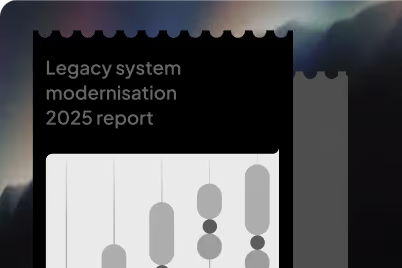AI-Accelerated Product Development

Introduction
In this conversation, the co-founders of Momentum91 discuss the integration of AI in product development, focusing on its role in accelerating the software development lifecycle, the challenges faced during integration, and the future of software engineering with AI. They explore practical strategies for utilizing AI tools, the importance of coding standards, and how AI can assist in resource allocation and server monitoring. The discussion emphasizes the need for developers to adapt and enhance their skills to effectively leverage AI in their workflows.
Key Takeaways
- AI can significantly accelerate product development processes.
- Integrating AI into existing workflows can present challenges.
- AI tools can help maintain coding standards and reduce errors.
- Developers need to adapt their skills to work alongside AI.
- AI can assist in resource allocation within development teams.
- Monitoring server performance with AI can prevent downtime.
- AI co-pilots can enhance coding efficiency and quality.
- Transitioning to AI-enhanced development requires a structured approach.
- AI tools can provide insights into team members' skill sets.
- The future of software development will heavily involve AI technologies.
Transcript
Yash Shah (00:01.23)
And we are, any guesses? No. Perfect. We are live. Hopefully we live. So today, for some people who might be surprised to see why are there only three cards, it's because while running an engineering company, we were not able to figure out a way to log in.
to a SaaS product but that's okay we're here and as soon as we figure out how to login we will have the fourth one join in as well awesome let's begin he's here he's here he's here yes
Perfect, are live Jay. And I am so sorry, I will be apologetic in the live stream as well. am so sorry for the technical glitch I have faced. No, that's okay. It's people like Harsh who built the technology. So, not your fault. So, thank you for joining in and hello and welcome to Momentum of S .R .S. My name is Yash and I joined by my co -founders.
Harsh, Jai and Kaushik to discuss topic of the week, using AI for accelerating product development. The goal is to provide you with actionable insights and practical strategies that you can apply to your own products. Throughout this session, we encourage you to engage with us by asking your questions and sharing your thoughts. This is a fantastic opportunity to learn from each other and give you insights that can help drive your SaaS initiatives forward. So let's get started. Jai, Kaushik, Harsh, how are we doing today?
Yes, looking great today. Doing great. Awesome. Excited. So here's my question. First question to Harsh. You already have AI. Why is my product still not ready? I have a weak product. That's the challenge. When making something gets easier, figuring out what to make becomes more more challenging. that's interesting. Good to know.
Yash Shah (02:28.334)
So while all of us are here, I think let's get started with this. From a product development standpoint, if I'm building a product today, how should I think about AI to accelerate my product development? So what are the places in a software development lifecycle where AI can come in, play a role, make things maybe more efficient, make certain things more redundant? Maybe if you can start with that.
Yeah, yeah, so yeah. So if we talk about the software development cycle, right? So firstly, once we get the design from the design team, right? So they did time we be making the architecture right? What are the clouds? What database we are using? What are the text that we are using? Right? So after we decided all these things, right? Once we start the development, right? So at that time, just consider key
for some of the features, right? You have to write some code and it will take around half an hour to write some small function, right? Then after, so in this phase, once you write the function, right? So there are so many things that we don't know, such like the other function, the logic we can rewrite, right? It's correct or not, right? The core quality that we have write is correct or not? Whether there are any vulnerability or security?
that we have missed out all these things. So each every stage of writing the code, right? it's a general thing when developers write the code, at that time they miss all these things, right? So at that time, if any tool we can say or any helper that is available that help us to tell you have missed these type of things during the development, right? So it can increase the development of the speed.
We can say, reduce the error bug fixing all these time things, right? So in this, we can say the cycle of, right? So when we start to writing the code, At that time, it will help us to, if we use the AI, right? It help us to write the code in the standard way. Okay, first things. the code will be written, On the second stage, it will set like the...
Yash Shah (04:53.56)
code quality, right? The weather we have followed the best practice or not, right? If there are some checklists that we should follow for any text check, right? Whether we have followed or not. So code quality that can be checked with using some AI tool, right? And the third we can say after writing the code after if we have all followed all the things, right? Then after third is the code security, right? Like the weather any vulnerabilities can be possible or not, right?
SQL injections can be have one or not with particular this code base. So we can check the code security tool. So we can say in these three stages, we can use the AI to product development to increase the development of product. We can say the increase the security of any products and yeah, right. So in this way, we can use the AI. Got it.
So, Harsh, is there any specific challenge that any company would face if they are trying the traditional way out and now they are planning to utilize AI, having maximum setup for the product development, utilizing AI, is there any specific challenge they might face at the earlier point? Yeah, so on the earlier point, if about the challenge, we talk about the change, right? So first is the currently there are many tools that are available open source, right?
But when we talk about the standards, The coding standards that we need to follow, right? So many libraries that are available, sorry, I just can you just elaborate what type of challenge are you talking about? just not understand. So at times, when companies try to integrate AI into their product development workflows at that time, just wanted to have an understanding. Are there any sort of challenges that they face at the earlier level because
Initially, there was some traditional setup which was there and all the code base was being generated on their own side. Yeah. So, okay about the things that like so we have we can say about the challenge, right? So there are some tools right? Like the GitHub or pilot right? Or Open AI Copax, right? They are the tools. So if you want to integrate whether the code already established or whether it is legacy code or you have just developed the
Yash Shah (07:15.534)
start new code, right? So integrations can be very easy, right? You just have to do sign up and there are some scripts and then you have to embed in your code or other integrations also possible like the if you are using the VS code, right? To write in the code. So you can integrate your this copilot or the cop ex in your code base, right? And then after you can you can select the code or you can select a file where you want to integrate the AI, right?
So on the initial base, if we talk about the challenge, then I think one of the surprising things that can be challenging, the price will be the high. But integrations are the integrations, but I don't think there can be any challenge. All right. So Harsh, I was thinking about this point. So when developers are trying to specifically develop new product development and want to develop SaaS products especially,
This is something which we have also noticed while designing as well as something we have discussed previously also that a lot of patterns with respect to SaaS products are fixed. Like you know that there's going to be an integration page, know that there's going to be teams, roles and as possible. There are certain things that are fixed and we can expect it to happen. So how does these AI co -pilots that are being in the market currently help you to
work with the boilerplate set of codebase that you can develop with. Do they aim with it or do suggest how does that work? And that's one and second thing is then you didn't mention about error reduction. I think that is one big plus point with respect to having Copilot part of your development, mean, along with your developers.
Could you brief a little bit more about the error in that? Yeah, sure. So if we use any code, right, so it can help us in three ways. Okay. So first is the writing the code, right? So like the in change GPT, right? We just write the prompt, right? And you can get the answer of any prompt, right? So the same way you can write some for your problem, like the you can say I want to write the function.
Yash Shah (09:38.722)
they will do some mail sending to the MailChem, right? You can just write the prompt and this co -op pilot can write the code for you, What are the language that you have decided? Okay, the first use case that can be is the writing the code by using just prompt. Okay, second use case that co -op pilot can use for is the you can say the photosuggestion, right? Like in the mail, right? If I write the
Hope if you just write the hope right to get the solution right hope you're doing great right so did so it co -operate the second use case is like they can help us to write the code repeat you just have to write some initial stage right in code in standard we can say there is a for loop there is a if -if we just have to write some of the few letters then automatically the other remaining code can be written right the third is third
Second is this one right and the third is the one where they can dictate the bugs or errors that can be increased by using this code. Right, so like you already have written this code right and then after this core pilot can tell you with this code that this type of error can be possible. Like the you can miss some if -else condition right or you can write you have written the logic wrong right. So before this thing goes on production.
this AI or co -op tool that help us before they tell us before these errors or these bugs can be generated using this code right so with this co -op pilot these three we can say mainly use cases that can be achieved right and the yeah and the first the problem that we discussed right the patterns or we can say the list of standards that already you predefined right and how AI can help us to follow this nice
So within this copilot tool, can write our own script, right? So like we can say the input size can be this, right? The intent size can be a four spaces, right? If we want to write some function, right? So we can define maximum length of any function can be the, we can say 100 lines, right? So you can write your own logic here and then AI tool can read this logic and
Yash Shah (12:01.677)
whenever you are writing this code right, they are checking the weather these rules are following or not. So in this way we can if we have some boilerplate right, where we define the all the restrictions or rules or all the standards that needs to be there for all right. So that AI tool can read that and they're constantly giving some notification or suggestions, you have missed this standard or these things. So in this way, developer can constantly know I have missed these things.
So before they are going to code review, when their things are going to get right. So during this development, we can reduce these things. Okay. Yeah. And did you get this right? When you do get the answer of the questions, right? Okay. Great. Yeah. And second thing is that we mentioned is the error. the how to, as I told you, this code copilot can
read the logic which we return and they already give us the suggestions this type of bugs and errors can be possible first right even after this copilot can miss these things right so when we are going to code review right so at that time also the AI not copilot the grid which can be useful where there are other tools also such like the solar cube right that can be useful in code review process
Right? So in code review process, this AI can read the logic that we have written and they will give the answer, like this is a vulnerability that can be we miss out. Right? So we can say there are two different things. Copilot is the one that help us to write the code in best standard way. Right? And the other things that we have integrated in the code review process. Right?
where we can find the vulnerabilities or any security issues that we have missed. In this way we can make sure the code that we have written, It's a, they follow standard respect is and it's a, we can say the not 100 % work free but we have not missed any big vulnerability before going on production. Yeah. The other piece that I want to understand from a business.
Yash Shah (14:21.965)
standpoint is, let's say I have a product and I have four or five engineers, mixture of full stack front end and back end. And I want, so they're coding right now, they're using co -pilots and I'm hearing about certain tools and platforms that AI can help us do A, B and C. But in a structured way, if I'm looking for my team of four or five engineers,
In structured way to transition from human level, like human code writing to human plus AI code writing, what are some steps and what are some tools that I should start with for transitioning from human to human plus AI sort of creation of product across design, requirement gathering, across writing the code, across all of those. Yeah. So,
So according to me, so on the initial stage, right, we have not give access of AI tools to the developer. So I am not talking about the design thing. So we start the once development is started, right? So initial base, if you want to use AI, right, to analysis code or for other things, then what we can do, we can put this AI things on the first step on the code review side. Okay. We can say where we have created a pipeline and where
Once the developer has pushed the code right after that in the next step is a code review right so in this step we can integrate our AI tool so that in this way AI can read the code and they will give you suggestions to the developer so in this way two things are happen okay first is the developer logic can be rechecked and they are not using the AI right so they can use their own logic
So that it will help us in future to build the logic in a good way, right? And the AI will give suggestions so that they can implement this and the other we can say help that can help us is the manager. Like the one who write, who review the code, right? So it can save much time for them before because before they will get the code right to review before that AI have checked all these things.
Yash Shah (16:48.097)
the small logic or small standards that needs to be followed. Right. So on the first stage, I can say on the code review cycle, we have first integrated the AI on the for the starting phase so that the manager and the board developer that can help us both to build the logic right. Right. Once we can say now the
We can say now we have a good standard product, right? They have built and it is going on like a production. They have you can also know frequency per second out. And after that, it can't, at that time we have to integrate this AI in the code, code writing tool. can say the, yeah. So because now it's very costly, right? To we can say.
without AI developer can write the code not write the code but AI can help us help them to write the code to check the logic during the development change so that it will take much time because now we need fast development and the best development we need the good quality of the code right and that time we can integrate the AI in the code development things yeah and once all these things done
Then the third can be is the we have to integrate in the we have been did AI in the on the server. It's a deployment site. Right. Once we have we now we know there are the huge traffic on server. Right. At that time, we need the monitoring. We need the analysis of the APIs or health check of our server. Right. Now, because at that time, we can't afford to crash our server. Right. We need some tool or that.
they will constantly monitor our traffic and they will before any server down before any crashing they will before that they will ping us or they will say notification these things are happening or server please check them right. So in this way we have to integrate AI in this development strategy. Correct, so you'd say that bringing in introducing AI in a structured format would be firstly
Yash Shah (19:08.717)
at the time of like wherever the pipeline is and then you work your way to bringing and introducing AI into earlier and earlier stages of development and then finally sort of for server monitoring as well. Yeah, right, right. Yeah. Then because when we have good traffic, right? So at that time we have set like the new relic, right?
they will give us the performance right? How our server is working? What are the number of requests that coming right? So we have all the data but now it's we have so much logs right? For such like we have a thousand of requests right? So we have so much log data now we need someone to analyze all these logs all these requests and give some insight or give some prediction that like we can say
around this two hour our server have high traffic and before we can say around the other hours we have very less traffic right so this type of configuration this type of information that will help that will save so much money and also they will give some insights like now we know within this hour we have high traffic right so during this time we can change the server configuration to handle the traffic
So in this way, that can help us to get more insight of our server. Got it. Yeah. Great. So yeah, I mean, these are great insights, sir. Thanks for sharing all these. There have been multiple doubts. So most of your answers, I mean, all the answers that you've given already clear a lot of things like what AI can do, especially in terms of product development teams, what it can replace or what it can optimize it.
I had a question with respect to like, you know, more related to, can it optimize the work of product manager? For instance, or like just to be, give you an example, like can AI assist in optimizing the resource allocation within the development teams? If let's say there are some deadlines or timelines that are supposed to be met and product manager is a team, but then he or she senses with respect to what sort of
Yash Shah (21:29.613)
know, resource allocation needs to be there to cover this part of development within this much amount of time.
So, are you saying that if we have crunch of resource, then AI can help us? But there's a challenge, right? So, a product manager doesn't give timelines, doesn't do resource allocation. So, product managers will revolt. They won't be assigning tasks. They'll just figure out what needs to be done. They typically is a tech lead or an engineering or someone who may not have that designation.
But someone from the engineering team themselves who will figure out the resource allocation. But sort of extending the question further from what Jai is saying is can AI sort of help figure out and this is sci -fi level stuff where who is best fit in the engineering team to work on what part of the code? Can it do reverse where AI says, this
type of work has previously been executed by Harsh and so from an allocation work allocation standpoint maybe if I am the tech lead it should prompt me saying you know this piece of work should be done by Harsh or something is that the possibility? Okay yeah so in my experience I don't have any tool I don't know any tool that can help us set like this allocation
Yeah, but yeah, but we can say that like the we can say we can do one thing, right? Set like the we can use AI to give some skillset right to the developer set like the one AI AI can help us to read the code right there will give you some good matrix set like the weather they the this core quality is what is a four by four out of five star right? So we can use this statics to decide
Yash Shah (23:36.973)
whether this particular developer is good in which text, like they are good in React or Node .js or on database whether they are able to write the query in optimized way or not. So in this we can say we can use this AI to define the skill set of any person and according to this skill set we can use the resource allocation easily. So in this way we can use the AI to define the skill set, define the
best outcome that we can get from our developer. Correct. But I think adding on to that based on what Harsh has explained so far, if everyone is using a similar copilot and if it is giving the same kind of solutions to everyone in the team, then does it mean that there is a common coding standard and a coding style that is being maintained that makes it much more easy for the team to work around?
Of of course. So yeah, so as I told you now we can so there is a by default there are some standards right there our co -pilot know right and then they are give services according to that right we can also tell co -pilot to these are some standards that we are following right so according to our we can say the our best practices this co -pilot can also train by this so that it will be great
for organization so that everyone have some what in the organization whatever solutions they are getting the standards or the we can say the best practice they all get the same thing so that it will be great for organization so that even if we can say the resource can be allocated to different project right so they are seeing the core standard core structure in the similar way they are already doing their work so it is easy for developer to understand the code
then they get to the good documentation or comments on the each functions. Yeah. So in this way, it will be great for organization. So if, AI is writing the code, if it is reviewing the code, if it is adhering to the guidelines, if it is finding out issues, and it is also helping in preventing certain issues. So, so if it is doing all of the, why, why, like, why do we need developers or engineers?
Yash Shah (26:02.829)
What is the purpose and I know that we still need it. I just want to know as to like what are your predictions in the sense that what will in the short term future, so let's say 2 -3 years later, what do you think the software developer or the software engineer role will evolve into? Yeah, so mostly you have heard, right, the developer are doing just copy paste on stack over, right? You heard that but
It reads some good skill set, right? To copy paste the code is fine. But then after you have to you have to put your logic right to update some of the things because you never get the same logic from anywhere, right? You can get some basic standard or can say basic logic, right? Then after you have to put your own logic, right? So similar way the AI can write the code for you, right? But you have to give some good prompt, right?
So you need some good skill set to give some proper prompt so that you will get the good output, right? the similar way, even if AI can give you a list of errors, right? That are need to be fixed, right? only the developer, right? Even if AI can fix some of the things, but still you need AI, you need developer to fix some of the errors. It can be possible that AI can do all these things, right? So in this way,
We can say in future it does not replace the software developer but it's required that software developer has need good skillset to use AI in their daily life to write the code we can say to analyze the code or finding the bugs in the whole cycle of process right but they need to understand how AI can help them to grow without AI
even without AI if they are doing the work in two days, right? And if they know AI can help us to do the same work in one day, even with good standard, right? So it needs to be, they need to be converting the second phase, right? Otherwise, they otherwise, yeah, doing this way. There's a good analogy that sorry, Kaushik, you were saying.
Yash Shah (28:27.085)
Sorry, I have a very non -techy answer for that. was going to say that why would Boeing need a pilot when they still have an autopilot mode of flight? There is one interesting point. I read it somewhere that after autopilot mode, the technology came into place is when the pace at which they serve the people have increased significantly.
There still a pilot in the flight who is monitoring and looking at everything. But I guess yeah. Yeah, right. And so there is a good analogy, right? So that I came across which was essentially I am old enough to know of a time when there was no software in accounting. So I have seen people create books of accounts without a lot of software.
And so the analogy that I sort of came across was what software did to every other industry, which is accounting, legal, finance, HR, whatever it is. What software did to all of those industries is what AI is doing to engineering, like product development. So to manage a team of 30 pre -software, you would need three HRs to do leave management and...
you know, to figure out what compensation and stuff like that. With software, we can have one part -time HR because we have a software that sort of is an HR MS, right? And so it just makes things better, more efficient, more optimal. And so it's like what software did to everything else is what AI is doing to software engineers is interesting way of thinking about it. we are nearing the time.
to end this conversation and so before we part Harsh, can you give us some names of AI tools, AI products that if my software or our software engineering team should look at? Yeah, so you can say if we want to help in development side, right? So like the writing the code or they will give some error, right?
Yash Shah (30:49.047)
So for that we can use the GitHub copilot, we have cursor, we have deep code or we can also use open AI, I think open AI core X or something like that. Okay. So there are some good platforms that can help us to help us in writing the code. Okay. So once we write the code, right. So at that time we need to test our software, right. So for that, like the, need to write any testing, right.
we need to test our website or software in all the devices. So for that we can use the SolarCube software then we can use. We can integrate this tool in the pipeline for the code review so that they review the code.
and they will give you some these are the things that we have missed out, these are standards that we have missed out, right? And also they will give you the vulnerability. So on the core testing, then we can use the SolarCube and I think the test AI is also one of the tools that we can integrate. Yeah. And on the, if you talk about the deployment side, right? When we need to check the health of our server, we need to monitor our APIs things, right? So
For that we are using the new relic or we can say the data log that help us to analyze all the logs that are coming to server and give some good insight. So on the server side we can use the new relic or data log. These are not the AI tools actual but they have the tools and once AI will come they have also started to use the AI in their products. Got it.
Awesome, that was a laundry list that is longer than I was expecting. But what we do is we link all of these tools and platforms wherever it is that you're watching whether it is YouTube or LinkedIn, we'll be adding them in the comments or the description so you'll be able to click on the link and explore those tools and platforms. We don't own or run any of them but we use
Yash Shah (33:11.383)
some of them for sure. hope Harsh we use some of them at Momentum as well. Yeah, yeah. good to know. But thank you everyone for joining in and see you in our next streams. Up until that time, please wherever you are consider following, consider subscribing. That will help us take these conversations to more and more people in the future. If you found this content helpful, please consider sharing it as well. Thanks again.
Until next time.
Bye.
The inbox update you’ll never want to skip
A quick catch-up with ideas, wins, and tips worth stealing, straight to your inbox every week.
The easiest way to reach us.
Share your details and we’ll get back within 24 hours.
Office hours
A plethora of insights,all in one place
From strategy to execution. All the big ideas, practical guides & fresh perspectives that’ll help you scale with confidence
Ebooks
Comprehensive guides that break down the shifts in business and technology, Helping you lead with clarity.

Office Hours
Your direct line to our experts. Practical advice for scaling, right when you need it.

Reports
Data-backed perspectives on where industries are headed, giving you the foresight to make bolder moves.

Newsletter
A quick catch-up with ideas, wins, and tips worth stealing, straight to your inbox every week.
.avif)
Podcasts
Conversations where you get to know everything from the ones who know it best.
.avif)
Your Offshore Development Center, Done Right
Access top-tier global talent, enterprise infrastructure, and complete regulatory compliance through our proven model.
Start Now








